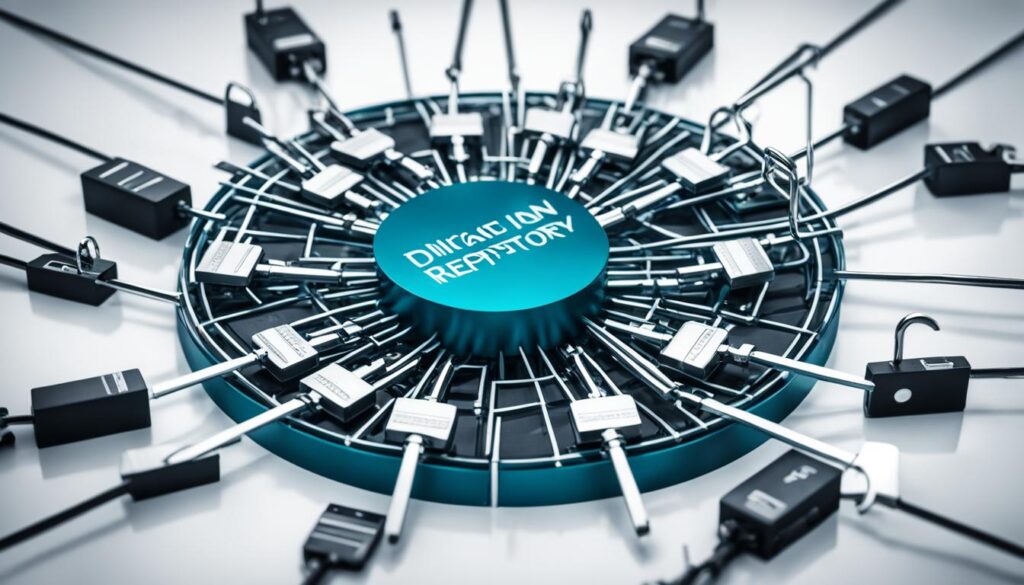Welcome to the world of IT privacy, where safeguarding your personal data and information is of utmost importance. In this digital age, it’s essential to understand what privacy means in information technology and why it’s crucial for your security.
Privacy in information technology refers to the right to keep your personal data secure and protected from unauthorized access. It involves ensuring that your sensitive information, such as financial details, medical records, and personal identifiers, remains confidential. By protecting your data privacy, you can prevent potential harms such as identity theft, data breaches, and reputation damage.
Privacy regulations, like the General Data Protection Regulation (GDPR), set guidelines for organizations to follow in order to protect your data. These regulations enforce data protection principles and ensure that companies handle your information responsibly. Data protection technologies and practices, such as data loss prevention (DLP) and encryption, play a crucial role in maintaining IT privacy.
By understanding the importance of privacy in IT, you can take control of your data and protect yourself from potential risks. Throughout this article, we will explore the difference between data protection and data privacy, discuss various data protection technologies and practices, and highlight the significance of data privacy in the digital age.
Contents
- 1 Data Protection vs Data Privacy
- 2 Data Protection Technologies and Practices to Protect Your Data
- 3 Importance of Data Privacy in the Digital Age
- 4 Enhancing Data Privacy: Tips for Individuals
- 5 Conclusion
- 6 FAQ
- 6.1 What is privacy in information technology?
- 6.2 Why is privacy important in IT?
- 6.3 What is the definition of privacy in IT?
- 6.4 Are there any regulations in place to protect IT privacy?
- 6.5 How can organizations protect information privacy in IT?
- 6.6 What are some IT privacy concerns?
- 6.7 Are there any laws regarding IT privacy?
- 6.8 What are the privacy risks in technology?
- 6.9 What are some best practices for IT privacy?
- 7 Source Links
Key Takeaways:
- Privacy in information technology ensures the security and protection of personal data and information.
- Data protection and data privacy are interconnected but have distinct differences in their focuses.
- Data protection technologies and practices play a vital role in safeguarding sensitive information.
- Data privacy is crucial in the digital age for preserving personal privacy and preventing potential harms.
- By adopting best practices and being aware of your privacy rights, you can enhance your data privacy and protect your online activities.
Data Protection vs Data Privacy
When it comes to safeguarding sensitive information, the terms “data protection” and “data privacy” are often used interchangeably. However, there is a distinct difference between the two concepts. Understanding this difference is crucial for organizations to effectively protect their data and ensure compliance with privacy regulations.
Data protection primarily focuses on the tools and policies implemented to restrict access to data and ensure its security and integrity. It involves measures such as encryption, access controls, and data loss prevention technologies. By implementing data protection practices, organizations can mitigate the risk of data breaches and unauthorized access to sensitive information.
On the other hand, data privacy is concerned with defining who has access to data and how it should be handled based on its sensitivity. Data privacy guidelines inform data protection measures and help organizations meet regulatory requirements. They establish the rules around collecting, storing, using, and sharing personal data, ensuring that individuals’ privacy rights are respected.
The relationship between data protection and data privacy is symbiotic. Data protection measures are implemented to uphold data privacy principles, while data privacy guidelines inform the implementation of data protection practices. Both aspects are crucial for maintaining the security and privacy of sensitive information.
To better understand the difference between data protection and data privacy, consider the following analogy:
“Data protection is like putting a lock on a safe, ensuring that only authorized individuals can access its contents. Data privacy, on the other hand, determines who has the key to the safe and under what circumstances it can be unlocked.”
By following data protection and data privacy best practices, organizations can establish a comprehensive framework to safeguard sensitive data and mitigate risks associated with unauthorized access and privacy breaches.
Data Protection Technologies and Practices to Protect Your Data
To protect your data, organizations can implement a range of effective technologies and practices. These measures help safeguard your sensitive information from unauthorized access, data breaches, and theft. Let’s explore some of the key data protection technologies and practices you can employ:
Data Discovery: Data discovery is an essential step in understanding your data landscape. This process involves identifying and categorizing sensitive information, mapping its locations and flows, and determining the best ways to secure it. By gaining a comprehensive understanding of your data, you can effectively implement targeted security measures.
Data Loss Prevention (DLP): DLP technologies play a crucial role in preventing unauthorized access, leakage, or theft of sensitive data. These solutions employ policies, monitoring systems, and remediation options to ensure that your data remains protected. With DLP in place, you can proactively detect and mitigate potential threats before they lead to data loss.
Built-in Data Protection in Storage Solutions: Storage solutions with built-in data protection features provide an additional layer of security for your data. These features can include redundancy, error correction, access controls, and encryption. By leveraging these capabilities, you can enhance the security and integrity of your data stored on various devices and platforms.
Benefits of Data Protection Technologies and Practices:
“Implementing robust data protection technologies and practices helps organizations safeguard their sensitive information, mitigate risks, and maintain regulatory compliance.”
By employing these technologies and practices, organizations can benefit from:
- Improved data security and confidentiality
- Reduced risk of data breaches and unauthorized access
- Enhanced compliance with data protection regulations
- Increased customer trust and loyalty
- Protection against reputational damage
Now that you’re familiar with some effective data protection technologies and practices, you are better equipped to protect your data from potential threats and vulnerabilities.

Implementing robust data protection technologies and practices helps organizations safeguard their sensitive information, mitigate risks, and maintain regulatory compliance. By utilizing effective data discovery methods, implementing data loss prevention solutions, and leveraging built-in data protection features in storage solutions, organizations can ensure the integrity and security of their data.
Importance of Data Privacy in the Digital Age
In the digital age, data privacy plays a crucial role in protecting personal information and preserving privacy in our technology-driven world. With the increasing reliance on digital platforms and online services, safeguarding sensitive data has become more important than ever. Preserving personal privacy and protecting personal information are essential for individuals and organizations alike.
Data privacy ensures that sensitive data, such as names, birthdates, and financial details, is only accessible to approved parties. It acts as a barrier against unauthorized access, preventing potential misuse of personal information. Additionally, data privacy measures help organizations comply with regulatory requirements, such as the General Data Protection Regulation (GDPR).
By prioritizing data privacy, individuals can safeguard themselves from various potential harms. Cyberattacks, online stalking, and scams can all have severe consequences on personal and financial well-being. Protecting data privacy creates a safe environment, reducing the risk of identity theft, fraud, and other malicious activities.
Being aware of data privacy rights is crucial for making informed choices about sharing personal data. Understanding the implications and risks associated with sharing information can help individuals make informed decisions about the extent to which they want to disclose personal details.
The Benefits of Data Privacy
Protecting data privacy offers several significant benefits:
- Security: By safeguarding personal information, data privacy ensures that sensitive data remains secure and protected from unauthorized access.
- Trust and Reputation: Organizations that prioritize data privacy build trust with their customers and stakeholders, enhancing their reputation.
- Compliance: Adhering to data privacy regulations helps organizations avoid legal and financial consequences associated with non-compliance.
- Customer Satisfaction: Customers appreciate organizations that prioritize data privacy, leading to increased customer satisfaction and loyalty.
To emphasize the importance of data privacy, consider the following quote:
“Data privacy is not just an option; it is a fundamental right that needs to be protected in the digital age.” – Tim Cook, CEO of Apple Inc.
The awareness and importance of data privacy continue to grow as technology advances. By prioritizing data privacy and taking necessary precautions, both individuals and organizations can contribute to a safer and more secure digital landscape.

| Data Privacy Measures | Benefits |
|---|---|
| Data encryption | Protects sensitive information from unauthorized access |
| Two-factor authentication | Enhances online account security |
| Privacy-focused browsing | Prevents tracking and profiling |
| Regular data backups | Ensures data availability in case of loss or breach |
| Privacy policy adherence | Buils trust and transparency with users |
Enhancing Data Privacy: Tips for Individuals
Protecting your personal data and enhancing your data privacy is crucial in today’s digital landscape. By implementing a few simple tips and best practices, you can ensure that your personal information remains secure and your online activities are protected.
Secure Browsing
When it comes to online communications, using secure browsing protocols is essential. HTTPS (Hypertext Transfer Protocol Secure) encrypts data transmitted between your browser and websites, making it more difficult for cybercriminals to eavesdrop on your conversations. Additionally, utilizing Tor (The Onion Router) can provide an extra layer of anonymity by disguising your IP address, enhancing your privacy online.
Privacy-Focused Search Engines
Choosing privacy-focused search engines like DuckDuckGo can help protect your online activities. These search engines prioritize privacy by not logging user data or tracking search queries. By using these search engines, you can prevent your search habits from being monitored and used for targeted advertising.
Trustworthy Virtual Private Network (VPN)
Implementing a VPN can safeguard your internet connection and protect against cyber threats. A VPN creates a secure, encrypted tunnel between your device and the internet, making it difficult for hackers to intercept your data. When choosing a VPN, opt for a reputable provider that prioritizes data privacy and has a strict no-logging policy.
Password Managers and Security Keys
Strengthening your online account security is crucial for protecting your personal data. Utilize password managers to securely store and generate strong, unique passwords for each of your accounts. Additionally, consider using security keys, such as hardware tokens or biometric authentication, for an extra layer of protection against unauthorized access.
Managing Privacy Settings
Lastly, managing privacy settings on social media platforms is vital for controlling the visibility of your personal information and interactions. Review and adjust your privacy settings regularly to ensure that only the intended audience can access your posts, photos, and personal details.
“Taking these steps to enhance your data privacy can provide peace of mind, knowing that your personal information is secure and your online activities are protected.”
By implementing these tips and best practices, you can enhance your data privacy and protect your online activities. Remember, safeguarding your personal data is a collective effort, and staying informed about the latest privacy measures is essential for staying one step ahead of cyber threats.
| Tips for Enhancing Data Privacy |
|---|
| Secure Browsing |
| Privacy-Focused Search Engines |
| Trustworthy VPN |
| Password Managers and Security Keys |
| Managing Privacy Settings |

Conclusion
In conclusion, IT privacy plays a crucial role in information technology, ensuring the protection of personal data and information from unauthorized access. The interplay between data protection and data privacy is essential for maintaining the security and integrity of sensitive data. With the digital age, data privacy becomes even more significant, preserving personal privacy, safeguarding personal information, and preventing potential harms.
Enhancing data privacy is essential for individuals to protect their personal data and maintain control over their online activities. By adopting practices such as secure browsing, using privacy-focused search engines, employing trustworthy VPNs, utilizing password managers and security keys, and managing privacy settings on social media platforms, individuals can strengthen their data privacy defenses.
It is crucial to prioritize data protection and privacy to ensure the security and confidentiality of sensitive information in today’s interconnected digital world. By understanding the basics of IT privacy, individuals and organizations can prevent data breaches, protect personal information, and maintain trust in the online environment.
FAQ
What is privacy in information technology?
Privacy in information technology refers to the right to keep personal data and information secure and protected from unauthorized access.
Why is privacy important in IT?
Privacy in IT is crucial for safeguarding sensitive data and preventing data breaches, reputation damage, and regulatory violations.
What is the definition of privacy in IT?
Privacy in IT refers to the protection of personal data and information from unauthorized access and disclosure.
Are there any regulations in place to protect IT privacy?
Yes, there are privacy regulations such as the General Data Protection Regulation (GDPR) in the European Union that enforce data protection principles and provide guidelines for organizations to follow.
How can organizations protect information privacy in IT?
Organizations can protect information privacy in IT by implementing data protection technologies and practices such as data loss prevention (DLP), encryption, and endpoint protection.
What are some IT privacy concerns?
IT privacy concerns include data breaches, unauthorized access, identity theft, and misuse of personal information.
Are there any laws regarding IT privacy?
Yes, there are IT privacy laws and regulations in different countries and regions that organizations must comply with to ensure the protection of personal data.
What are the privacy risks in technology?
Privacy risks in technology include data breaches, unauthorized access, data leakage, cyberattacks, and misuse of personal information.
What are some best practices for IT privacy?
Best practices for IT privacy include inventorying data, minimizing data collection, implementing proper access controls, using encryption, and being transparent with users about data handling practices.




